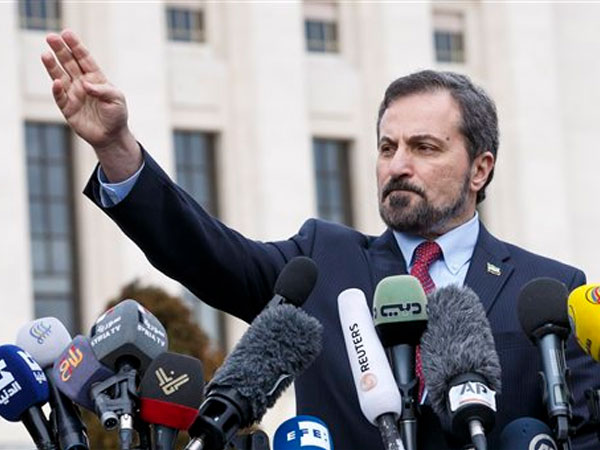
Louay Safi, spokesperson for the Syrian National Coalition, speaks to the media during a news conference after the second round of negotiations between the Syrian government and the opposition at the European headquarters of the United Nations, in Geneva, Switzerland, Saturday, Feb. 15, 2014. AP.
BEIRUT, Lebanon—Syria’s foreign minister accused the United States of trying to create a “negative climate” for dialogue at the second round of peace talks in Geneva, while Secretary of State John Kerry blamed “the Assad regime’s obstruction” for making the tense talks even more difficult.
The comments by Walid al-Moallem on Sunday came a day after the meetings between Syrian President Bashar Assad’s government and the opposition seeking his ouster ended without finding a way of breaking the impasse in the nearly three-year-old conflict.
Al-Moallem spoke to the state news service about the talks as the Syrian delegation was returning from Switzerland to Damascus. He said the U.S. tried to “create a very negative climate for dialogue in Geneva.”
Kerry’s statement late Sunday repeated the U.S. commitment to finding a political solution to the conflict, and he praised the opposition’s “mature seriousness of purpose and willingness to discuss all aspects of the conflict.”
In contrast, Kerry said, “while it stalled in Geneva, the regime intensified its barbaric assault on its civilian population with barrel bombs and starvation. It has even gone as far as to add some of the opposition delegates at Geneva to a terrorist list and seize their assets. This is reprehensible.”
Syria’s conflict started as largely peaceful protests against Assad in March 2011 but later degenerated into a civil war in which more than 140,000 people have been killed, according to activists.
The United Nations’ human rights office said in January it has stopped updating the death toll from the war, confirming that it can no longer verify the sources of information that led to its last count of at least 100,000 in late July.
Millions have been driven out of their homes, seeking shelter in neighboring countries and in safer parts of their homeland.
Washington, its European and Persian Gulf allies are backing the opposition in Syria’s conflict. Russia and Iran are supporting Assad’s government.
U.N.-Arab League mediator Lakhdar Brahimi apologized to the Syrian people for failing to reach progress.
“I am very, very sorry, and I apologize to the Syrian people that their hopes which were very, very high that something will happen here,” Brahimi said Sunday.
More than 5,792 people have reportedly have been killed in Syria since the Geneva talks began on Jan. 22, activists said.
The talks’ modest achievement has been a U.N.-brokered truce in the central city of Homs that has allowed aid workers to deliver some food and medicine for hundreds trapped in the rebel-held areas. More than 1,000 people were also evacuated from the city, which has been under government blockade for more than a year.
On Sunday, an official with the Syrian Arab Red Crescent said its workers have entered the western Damascus suburb of Moadamiyeh to deliver food for the first time in 15 months of government blockade.
Khaled Erksoussi, the head of operations with the Red Crescent told The Associated Press that the agency was allowed to take 500 food parcels into the suburb. A truce has been in place in the area for two months, Erksoussi said, but Moadamiyah remains surrounded by army checkpoints and troops.
Erksoussi appealed for more aid to be allowed for at least 10,000 residents of the suburb that was attacked by chemical weapons in August.
The leader of Lebanese militant group Hezbollah, Sheik Hassan Nasrallah, pledged to fight on alongside Assad’s troops until Sunni Muslim extremists fighting with the rebels are defeated.
“We will remain where we should be, our policy hasn’t changed,” Nasrallah said in a televised speech to commemorate the death of three of the group’s leaders, including top military commander Imad Mughniyeh who was killed in a Damascus car bombing in 2008.
Hezbollah fighters have been key to the Syrian army’s success on the battlefield since June, when they helped Assad’s forces dislodge rebels from the opposition stronghold of Qusair near the border with Lebanon.
Nasrallah said Hezbollah fighters have also been fighting in the Syrian capital. He acknowledged that some have fallen, but said it was a worthy sacrifice because the group is “gaining experience and strength in Syria.”
“We will be victorious. It’s only a matter of time,” Nasrallah said.
RELATED STORIES
No hint of compromise as Syria peace talks enter day two
Ban Ki-moon boots Iran out of Syria peace talks